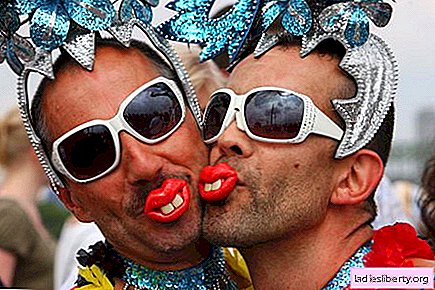
While in many Western countries active lobbying for the rights of homosexuals has significantly expanded their rights, up to the possibility of entering into same-sex marriage and adoption of children, Russia will continue to stand on the positions of traditionalism, legally enshrining the ban even on holding gay parades. And a hundred years in advance.
The editors of the Internet portal "Women's Opinion" formulated four simple questions to find out what the female part of society thinks about it. The women were asked if they were ready, following the example of Western countries:
Question 1: Allow regular gay parades on the streets of your city?
Question 2: Allow formal gay marriage?
Question 3: Allow adoption of children by same-sex families?
Question 4: Replace the concepts of “mom” and “dad” in the official document flow with the terms “parent No. 1” and “parent“ No. 2 ”?
It was proposed to provide explanations for the answers, and summing up the heated discussion, two interesting points can be noted.
First moment: Almost all survey participants gave the same answer (either yes or no) to all four questions. This shows that society in Russia is divided into two camps of participants who are very categorical. Either believing that homosexuals do not deserve any rights at all, or on the contrary claiming that they are entitled to all the rights of ordinary people, including even the adoption and upbringing of (adopted) children.
The second moment: the camp of supporters of the traditional society turned out to be more numerous (70% of respondents), but the camp of supporters of equal rights for gays (30%) was much more assertive and noisy in defending his innocence. And this repeats the situation in society as a whole, when the issue of the rights of sexual minorities is so actively discussed in the mass media, as if the number of homosexuals in Russia has increased many times. However, in reality, this is one of those cases when the media become the mouthpiece of a minority in order to impose a certain point of view on the majority.
There was also no shortage of points of view expressed during the survey, but on the whole they can be expressed through several answers that serve as generalizations.
Proponents of gay rights cite the following argument as the main one: “If we live in a democratic society, then, of course, a person living in such a society will answer all the questions:“ Yes. ” Personally, I, as a psychologist, can say for sure that homosexuality is not contagious. And even same-sex parents will not affect the sexual orientation of the child. There is a mass of scientific, medical and psychological literature proving this! ”
The most typical response of the supporters of traditional society is: “I answered NO. And she even explained why. Let them love as they want, from time immemorial there has been this homosexuality, and you won’t get anywhere ... He even exists in the animal kingdom. But! Why advertise it and put it on public? I don’t know, I’m old-fashioned and uninteresting probably, but it’s better to advertise ordinary families, “Dad + Mom + children”, to focus on long-term relationships, on family values. And all sorts of "deviations" - yes, let them be, this does not need to be hidden. But we do not arrange parades of people suffering from Down syndrome and Autism. ”
In general, in the discussion, the advocates of gay rights show themselves as radical liberals expressing not just indifferent, but even negative attitudes towards the existing society and the institution of family and marriage, considering them a relic of the past and accusing the proponents of traditional values of backwardness, old-fashioned and narrow-mindedness. In addition, they express a clearly negative attitude towards the church and the Soviet period of history - considering them responsible for “zombifying” people with “wrong backward ideas”. At the same time speaking in support of the whole “Western” and, in their opinion, “progressive”.
The defenders of the traditional family, on the other hand, hold conservative positions, defending the institution of the church and supporting many of the moments characteristic of the Soviet period - considering them more suitable for building a prosperous and healthy society.
It is unlikely that this debate will be over in society in the near future, however, the severity of this discussion will largely depend on which part of the society, whether conservative or liberal, will relate itself to power.











